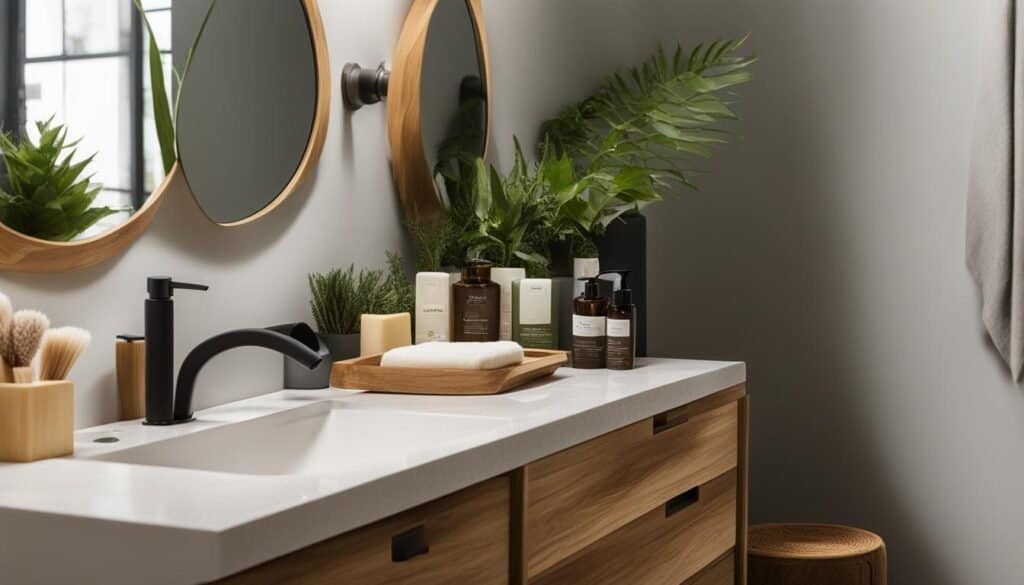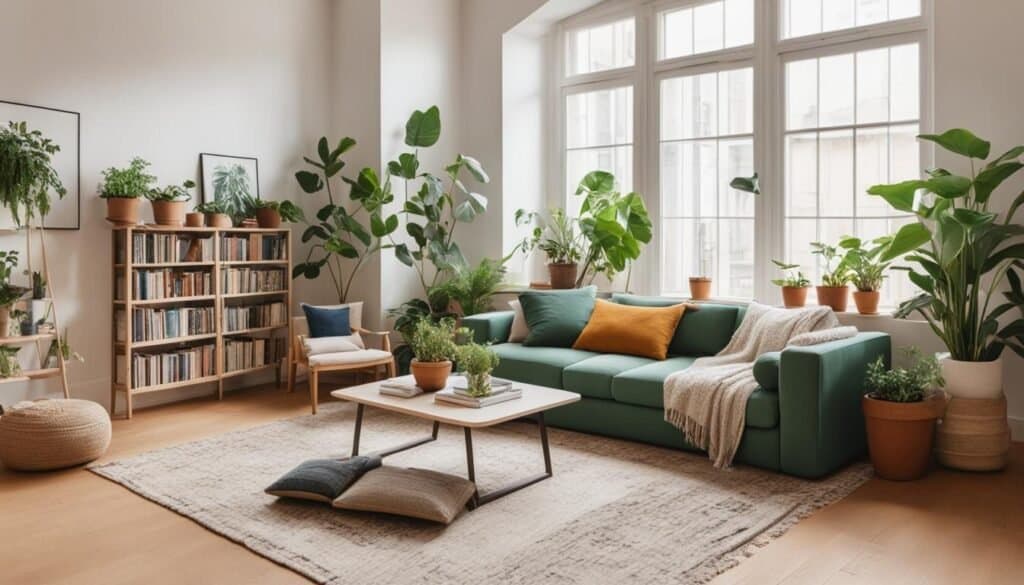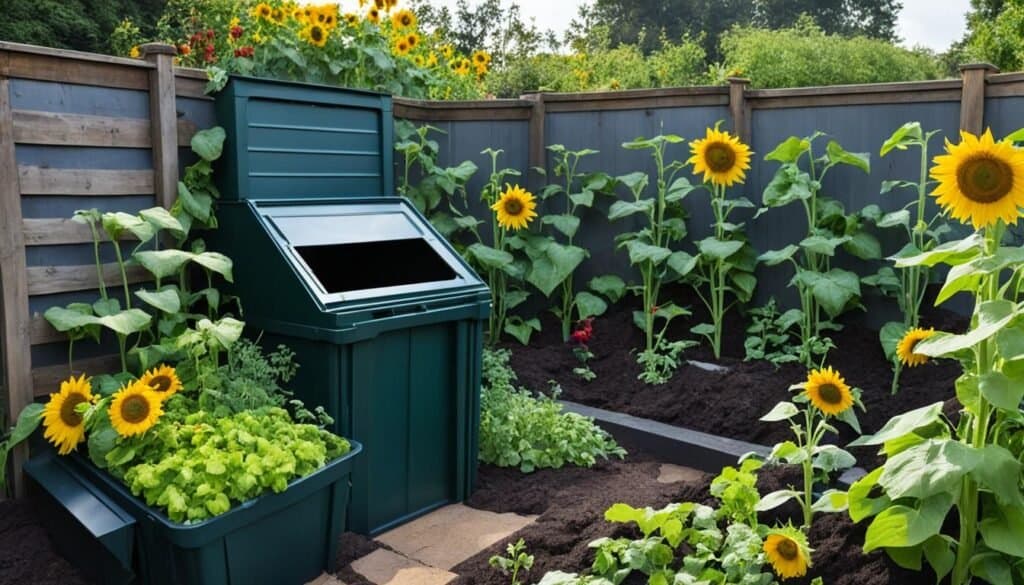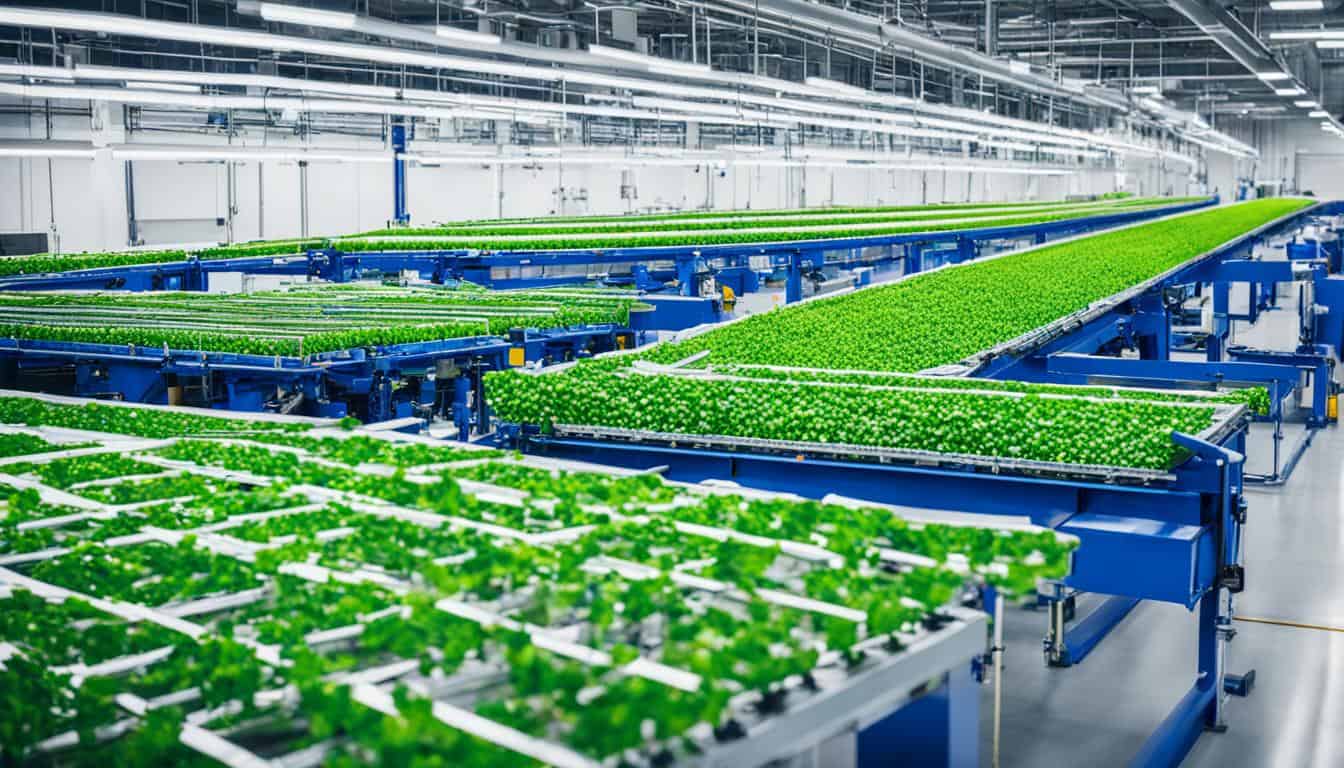As we witness the increasing urgency to protect our planet and preserve its natural resources, it’s essential to adopt a more eco-friendly and sustainable living approach. One significant way we can make a difference is by incorporating eco-friendly and biodegradable household items into our daily lives.
These products are designed to break down quickly, helping to reduce waste and preventing damage to our environment. By choosing household items made from plant-based materials, we can promote zero waste cleaning, minimize landfills, and decrease our reliance on single-use plastic and harsh chemicals. In this guide, I will share 51 eco-friendly and biodegradable items that can help you lead a greener, more carbon-neutral lifestyle.
Key Takeaways:
- Transition to eco-friendly and biodegradable products for a greener lifestyle.
- Opt for household items made from plant-based materials to reduce waste and protect the environment.
- Consider zero waste cleaning products and compostable alternatives to single-use plastic.
- Reduce your dependence on harsh chemicals and non-recyclable materials.
- Make small, sustainable changes in each room of your home for a lasting impact.
- Support businesses that prioritize ethical and sustainable practices.
- Think globally and act locally to champion sustainability in your community.
51 Eco-friendly and Biodegradable Household
Here is a list I used in my own house to change to an eco-friendly home. Please let me know if I should add any more to the list!
Kitchen
- Reusable produce bags – Bring these shopping to avoid plastic bags for fruits and veggies
- Beeswax wraps – Use to cover bowls and wrap food instead of plastic wrap
- Glass storage containers – Opt for glass over plastic to store leftovers and meal prep
- Metal straws – Use reusable straws rather than plastic ones that end up in oceans
- Vegetable scrub brush – Look for ones made of natural materials that can be composted
- Dishwasher detergent pods – Choose a brand that uses dissolvable packaging instead of plastic
- Reusable paper towels – Swap paper towels for reusable cotton cloths to cut waste
- Compost bin – Compost food scraps to reduce greenhouse gases and landfill contributions
- Reusable snack bags – Use washable fabric bags for snacks rather than disposable plastic ones
- Metal tins – Store dry goods in reusable tins instead of plastic bags or containers
Bathroom
- Shampoo bars – Opt for solid shampoo without plastic bottles
- Bamboo toothbrushes – Choose biodegradable bamboo over plastic toothbrushes
- Safety razors – Use reusable razors with replaceable blades rather than disposable razors
- Soap bars – Soap bars last longer than liquid hand soap and avoid plastic pumps
- Linen shower curtain – Pick a natural fabric shower curtain that’s compostable
- Recycled toilet paper – Look for toilet paper made from recycled paper waste or bamboo
- Natural loofah – Biodegradable loofah sponges can replace plastic poufs
- Reusable cotton rounds – Use washable cotton pads instead of disposable cotton balls
- Menstrual cup – Switch from tampons and pads to a reusable cup to reduce waste
- Natural deodorant – Choose deodorant without anti-perspirant and with biodegradable packaging
Cleaning
- Wool dryer balls – Replace plastic dryer sheets with reusable wool balls
- Castile soap – An all-purpose, biodegradable cleaner that avoids harsh chemicals
- Microfiber cloths – Wash and reuse cleaning cloths rather than paper towels
- Eco-friendly dishwashing liquid – Look for plant-based formulas in recyclable packaging
- Eco-friendly laundry detergent – Choose a biodegradable formula in cardboard packaging
- Stainless steel cleaning tools – Opt for reusable stainless steel scrubbers over disposable plastic
- Glass spray bottles – Reuse glass bottles for DIY cleaners instead of plastic ones
- Compostable trash bags – Choose bags that will break down in commercial composting facilities
- Eco-friendly hand soap – Pick plant-based hand soaps with plastic-free packaging
- Natural scrubbing brush – Choose brushes with replaceable natural fiber brush heads
Outdoor
- Cotton gardening gloves – Biodegradable option for yardwork over plastic and leather gloves
- Cast iron grill brush – Opt for reusable brush with replaceable heads instead of disposable pads
- Natural mosquito repellent – Avoid DEET and other harsh chemicals with plant-based repellents
- Recycled garden tools – Support companies making tools from recycled plastic waste
- Cotton hammock – Choose an organic fabric hammock that won’t be around for centuries like synthetic ones
- Natural weed killer – Skip the chemicals with DIY weed killers made from household ingredients
- Metal watering can – Pick a reusable galvanized metal can over cheap plastic ones that easily break
- Natural fertilizer – Nourish your garden with compost instead of chemical fertilizers that pollute
- Cotton rope – Useful for gardening and camping, and biodegradable unlike nylon and polypropylene ropes
- Reusable silicone bags – Use to store garden harvests instead of disposable plastic bags
General Household
- Rechargeable batteries – Reduce waste by using rechargeable batteries for electronics instead of disposable
- Recycled paper towels – When you need paper towels, choose ones made from recycled materials
- Wool dryer balls – Soften laundry naturally and reduce lint instead of plastic dryer sheets
- Natural candles – Avoid paraffin wax with soy, coconut, or beeswax candles
- Glass food storage – Opt for glass containers over plastic to store and reheat leftovers
- Safety razor – Reduce waste by using a reusable handle and replaceable blades for shaving
- Metal ice cube trays – Pick durable stainless steel over plastic trays that easily crack
- Cotton string lights – Choose biodegradable natural fiber lights over plastic for decorating
- Glass jars – Reuse jars to store pantry items and reduce the need for plastic containers
- Reusable bags – Keep reusable bags in your car and purse so you never need plastic bags when shopping
- Reusable water bottle – Stay hydrated sustainably with a bottle you can wash and reuse instead of buying disposable plastic bottles
Embracing a More Sustainable Home Environment
As global awareness increases around the importance of living sustainably, more homeowners are seeking ways to reduce their environmental impact for a greener lifestyle. With various eco-friendly household solutions available and a wealth of sustainable living tips, you too can make simple yet significant changes within your home for a lasting, positive impact on the planet.
Small acts, when multiplied by millions of people, can transform the world.
Understanding the Basics of Sustainability
Sustainability revolves around the ability to maintain an action or process indefinitely without exhausting resources or precipitating environmental harm. This concept considers our stewardship of Earth’s natural resources, pollution patterns, and our impact on climate change and biodiversity loss. By embracing sustainable practices at home, we can reduce greenhouse gas emissions and pave the way for a brighter, cleaner future.
Small Changes, Big Impacts: The Power of Eco-conscious Living
Every choice we make in our household can make a difference. Focus on these areas for a significant reduction in your environmental footprint:
- Energy conservation: Switch to energy-efficient LED lighting, unplug electronics when not in use, and adopt devices with smart technology to regulate energy usage automatically.
- Water conservation: Install low-flow faucets and showerheads, fix leaks promptly, and consider using a rain barrel to collect water for lawn irrigation.
- Zero waste: Commit to a zero-waste lifestyle by reducing single-use plastics, practicing recycling and composting, and choosing reusable or biodegradable products.
- Toxin-free living: Opt for non-toxic, environmentally friendly cleaning products and materials to decrease indoor pollutants and promote a healthier living space.
- Conscious consumption: Purchase high-quality, long-lasting items made from sustainably sourced materials, and consider the lifecycle of products before buying.
By implementing these sustainable living tips, you’ll foster a more eco-friendly household and contribute positively to the global shift towards protecting our environment for future generations.
Transforming Your Kitchen with Eco-friendly Essentials
The kitchen is often the heart of sustainable transformations in the home. By adopting eco-friendly essentials such as stainless steel appliances, glass containers, and compost systems, we can significantly reduce our environmental impact. Whether it’s opting for a plant-based diet or supporting local farmers, these choices foster a more sustainable food system. Durable materials like bamboo and silicone offer stylish and reusable alternatives to disposable kitchenware, while energy-efficient dishwashers and innovative water filtration systems can save thousands of gallons of water annually.
These eco-friendly kitchen essentials encapsulate the perfect blend of functionality and sustainability. To help you get started on your green kitchen journey, we’ve compiled a list of some must-have items and practices:
- Switch to energy-efficient stainless steel kitchen appliances
- Adopt a plant-based diet to reduce your carbon footprint
- Choose organic cotton or bamboo towels for drying dishes and hands
- Incorporate bamboo dinnerware and utensils for a stylish and earth-friendly serving option
- Start composting to divert food waste from landfills
- Select zero waste coffee products like reusable filters and coffee beans in bulk
- Opt for silicone food storage containers or beeswax wraps
- Install an energy-efficient dishwasher to save water and energy
- Support local farming by purchasing seasonal produce at farmers markets, or join a Community Supported Agriculture (CSA) program
- Eliminate single-use plastics by choosing plastic-free alternatives
With these earth-conscious choices, we can collectively make a meaningful difference in preserving our planet for future generations.
“The greatest threat to our planet is thinking someone else will save it.”
Making a change begins with ourselves. Transforming our kitchens into eco-friendly havens is a powerful step towards supporting the environment and nurturing a sustainable lifestyle. Together, let’s pave the way for a greener future.
Natural Cleaning: Non-toxic and Biodegradable Supplies
Transitioning to natural cleaning supplies is a significant move toward household sustainability. By utilizing biodegradable formulas and homemade cleaners made with naturally sourced ingredients, we reduce the need for harmful chemicals in our homes. Furthermore, embracing eco-friendly products like compostable paper towels and Swedish dishcloths, we can drastically decrease household waste and contribute to water conservation.
Homemade and Naturally Sourced Cleaners
Non-toxic cleaners made from natural ingredients like baking soda, vinegar, and lemon juice offer an effective and environmentally friendly alternative to traditional cleaning supplies. These ingredients are readily available, affordable, and free from harsh chemicals. Moreover, by reducing our dependence on store-bought cleaners, we also contribute to the reduction of single-use plastic packaging.
Composting Organic Scraps and Reducing Waste
While compostable paper towels and Swedish dishcloths help decrease household waste, incorporating other waste-reduction strategies is essential to nurturing an eco-friendly home environment. One option is implementing a composting system, which allows us to turn organic scraps into valuable soil amendments. Not only does composting help reduce the amount of waste ending up in landfills, but it also promotes water conservation by reducing the need for synthetic fertilizers.
To further reduce waste, consider using eco-friendly dishwasher tablets. These tablets typically come in biodegradable and plastic-free packaging, making them a sustainable alternative to conventional dishwasher detergents. By consciously choosing natural cleaning products and adopting sustainable waste practices, we can significantly contribute to creating a cleaner, greener home environment.
Green Innovations for Your Bathroom Routine

The bathroom may be a smaller space within the home, but it holds ample opportunity for green innovation. Swapping traditional plastic toothbrushes for biodegradable toothbrushes, using shampoo bars, and adopting silicone menstrual cups can drastically cut down on bathroom waste.
Tools like bamboo toilet brushes and natural sponges crafted from cellulose or coconut fiber make for an equally effective and more sustainable cleaning arsenal. Moreover, investing in refillable containers for toiletries emphasizes the value of reusing resources over contributing to single-use waste, paving the way for a zero waste bathroom routine that aligns with an environmentally responsible lifestyle.
Incorporating eco-friendly toiletries and organic personal care products into your daily routine helps to significantly reduce the environmental impact of your bathroom habits.
- Biodegradable toothbrushes: Opt for toothbrushes made from bamboo, which are both sustainable and compostable.
- Organic personal care products: Choose products made with organic ingredients and eco-friendly packaging to minimize waste and pollution.
- Shampoo bars: Use solid shampoo bars instead of plastic bottles to reduce plastic waste in your bathroom.
- Silicone menstrual cups: Replace disposable feminine hygiene products with reusable menstrual cups, which are not only better for the environment but can save you money in the long run.
By implementing these products and practices, you can create a greener and more sustainable bathroom routine, benefiting both your personal wellbeing and the environment.
| Eco-friendly Product | Description |
|---|---|
| Biodegradable Toothbrushes | Made of bamboo, these toothbrushes are compostable and sustainable. |
| Organic Personal Care Products | These products feature natural ingredients and eco-friendly packaging to reduce waste. |
| Shampoo Bars | Solid shampoo bars eliminate the need for plastic bottles and offer a zero-waste alternative. |
| Silicone Menstrual Cups | A reusable alternative to disposable feminine products, these cups save money and reduce waste. |
| Bamboo Toilet Brush | A sustainable and eco-friendly alternative to plastic toilet brushes. |
| Natural Sponges | Made from cellulose or coconut fiber, these sponges are an eco-friendly option for bathroom cleaning. |
| Refillable Containers | Using refillable containers for toiletries reduces single-use waste and emphasizes reusing resources. |
Eco-friendly and Biodegradable Household Items for Your Living Space

Curating a sustainable living space is essential for reducing our environmental footprint and ensuring a healthier home environment. By choosing eco-friendly furniture and decorations made from recycled materials, incorporating energy-efficient bulbs, and embracing green electronics, we can transform our living spaces into eco-friendly havens. In this section, we’ll explore sustainable decorating and green electronics that can help you create a sustainable interior design.
Decorating with Sustainable Materials
Sustainable decorating begins with selecting materials that have minimal environmental impact. Opt for furniture crafted from sustainably harvested wood or recycled materials, ensuring a lower carbon footprint and a more eco-friendly living space. When choosing rugs, curtains, and other soft furnishings, look for items made from organic materials, such as cotton, hemp, or bamboo. These materials are not only eco-friendly but also add a touch of nature and comfort to your living space.
Remember to avoid products containing VOCs (volatile organic compounds) and opt for water-based, low-VOC paints for your walls to ensure a healthy air quality within your living space.
Energy-efficient Lighting and Electronics
Saving energy is not only good for the environment, but it also helps reduce household expenses. Switch to energy-efficient bulbs, such as LED or CFL bulbs, which consume less power and last longer than traditional incandescent bulbs. Green electronics, including appliances and devices with ENERGY STAR ratings, can significantly reduce your home’s electricity consumption.
Consider integrating solar energy systems and water catchment solutions into your home design, further promoting the use of renewable energy sources and water conservation.
To create the ultimate sustainable living space, invest in air purification technologies, such as air purifiers and houseplants. Houseplants offer a natural way to clean indoor air and add a pleasant, relaxing touch to your home.
| Eco-friendly Furniture Materials | Energy-efficient Lighting Options | Green Electronics Features | Air Purification Techniques |
|---|---|---|---|
| Reclaimed Wood | LED Bulbs | ENERGY STAR Appliances | Air Purifiers |
| Bamboo | CFL Bulbs | Smart Thermostats | Houseplants |
| Recycled Metal | Smart Lighting Systems | Energy-saving Power Strips | HEPA Filters |
Creating a sustainable living space encompasses mindful choices in furniture, decorations, lighting, and electronics. By incorporating these eco-friendly and biodegradable household items, you’ll contribute to a more sustainable and healthier living environment for you and your family.
Sleep Green: Eco-friendly Bedroom Upgrades

Creating a sustainable bedroom not only benefits the environment, but also improves your overall sleep hygiene and well-being. With the right combination of eco-friendly bedding, mattresses, and furniture crafted from natural, biodegradable materials, you can foster a cleaner, healthier sleep environment.
Organic Bedding for a Better Sleep
One of the best ways to enhance your sleep quality is by opting for organic cotton bedding and organic wool blankets. These natural materials are not only soft and comfortable but also free from harmful chemicals and toxins. By choosing organic, you foster a non-toxic sleep environment that can significantly improve the quality of your rest, making you feel refreshed when you wake up.
Eco-friendly Mattresses and Furniture Options
Investing in eco-friendly mattresses and sustainable furniture can lead to a greener, healthier bedroom. Natural materials like latex, organic cotton, and sustainably sourced wood offer excellent alternatives to traditional, non-sustainable options. By making eco-conscious choices that prioritize health and sustainability, you can create a bedroom that caters to your needs without compromising the well-being of our planet.
Transitioning to a sustainable bedroom is achievable through careful selection of organic beddings, eco-friendly mattresses, and durable furniture made from natural materials. Incorporating these elements into your space not only allows you to enjoy a cleaner and healthier sleep environment but also supports long-term environmental goals, ultimately contributing to a greener future for generations to come.
Creating a Sustainable Garden and Outdoor Haven

Transforming your outdoor space into a sustainable garden is an enriching way to embrace nature’s rhythms. Implementing organic gardening principles, composting and rainwater harvesting systems, as well as eco-friendly landscaping ideas, can help create an outdoor haven with minimal environmental impact. With a focus on outdoor sustainability, you can enjoy a beautiful garden that nourishes both your soul and the planet.
One of the foundational aspects of an eco-friendly garden is organic gardening. By avoiding synthetic pesticides and fertilizers, you help maintain soil health and reduce water pollution. You can further enhance your sustainable garden by incorporating composting. Composting kitchen waste and landscaping debris not only reduces landfill contributions but also adds valuable nutrients back into the soil, promoting plant health and vibrancy.
Through green outdoor practices, the sustainable garden becomes an oasis that supports vital ecosystems and harmonizes with nature’s wonders.
Another sustainable gardening practice is rainwater harvesting. By collecting and storing rainwater, you can irrigate your plants with an eco-friendly water source, conserving precious potable water resources. Pairing rainwater harvesting with drought-tolerant or native plants amplifies its benefits and further promotes water conservation.
An integral part of eco-friendly landscaping is the use of plant-based garden tools and materials. Opting for tools made from durable, biodegradable materials like bamboo and wood can help reduce your garden’s plastic consumption and overall environmental impact.
When designing a sustainable garden, it’s essential to consider the biodiversity of your space. Incorporating pollinator-friendly plants like lavender, bee balm, and coneflowers attracts bees, butterflies, and other essential pollinators that help maintain vital ecosystems. Encouraging biodiversity not only enlivens your garden with a colorful array of flora and fauna but also fosters a thriving ecosystem that all species can enjoy.
| Garden Element | Eco-Friendly Choices |
|---|---|
| Plant selection | Drought-tolerant, native plants and pollinator-friendly species |
| Water conservation | Rainwater harvesting systems, drip irrigation, and mulching |
| Composting | Reusable bins and tumblers or simple DIY compost piles |
| Garden tools | Bamboo, wood, and other plant-based materials |
| Pest control | Organic, chemical-free options such as companion planting and neem oil |
By enriching your outdoor space with sustainable garden practices, you are actively fostering a lifestyle that respects and harmonizes with the natural world. Embracing eco-friendly landscaping and green outdoor practices, you contribute to a more sustainable future while enjoying a gorgeous, environmentally responsible haven right in your backyard.
Sustainable Shopping: Reducing Your Carbon Footprint

Conscious shopping habits are crucial for reducing our carbon footprint. Embracing eco-friendly shopping practices not only benefits the environment but also encourages sustainable purchasing decisions. By adopting reusable bags, sustainable containers, and plastic-free products, we can actively participate in environmental stewardship and help combat climate change.
Reusable Bags and Containers
One of the easiest and most impactful ways to adopt eco-conscious shopping habits is to use reusable bags and containers. Rather than relying on single-use plastic bags, opt for durable, washable bags made from natural fibers like cotton or jute. These eco-friendly alternatives significantly reduce the amount of plastic waste entering our landfills and oceans. Likewise, utilizing sustainable containers made from materials like glass, stainless steel, or silicone for food storage and on-the-go meals can help minimize the demand for disposable plastic containers.
Considerations for Sustainable Purchasing Decisions
Making sustainable purchasing decisions involves considering the lifecycle of products, including their materials and manufacturing processes. Opting for items that have a lesser environmental impact is an investment in a healthier world. Look for products that are made from sustainably sourced, biodegradable materials or recycled content. Prioritize purchasing from businesses that demonstrate a commitment to sustainability, such as those offering certified B Corp products or adhering to fair trade principles.
Moreover, adopting green consumer choices can extend beyond the products we purchase. For example, buying local produce reduces transportation emissions, and supporting brands that implement sustainable packaging contribute to overall carbon footprint reduction.
Ultimately, each sustainable shopping decision contributes to a larger narrative of environmental stewardship and proactive efforts to combat climate change. By integrating eco-friendly practices into our daily lives, we are collectively fostering a future where sustainability is the norm.
Conclusion on Eco-friendly and Biodegradable Household Items
In conclusion, exploring the vast array of eco-friendly and biodegradable household items available today can inspire a significant shift towards a more sustainable living. Each eco-conscious choice we make, whether it’s selecting products made from bamboo, organic cotton, or simply incorporating more plant-based ingredients, contributes to reducing our environmental impact. Embracing a green lifestyle not only benefits our planet but also transforms our daily living into a more environmentally responsible experience.
Environmental stewardship goes beyond the products we use; it’s about fostering a mindset that appreciates the interdependence between our daily lives and the health of our planet. As we champion sustainability throughout our homes, we acknowledge the pressing need to protect our environment for future generations. Making small, but consistent eco-conscious choices significantly contributes to a larger collective effort in combating climate change and preserving natural resources.
From investing in energy-efficient appliances to using biodegradable products, every step we take towards sustainable living matters. As we continue to adopt eco-friendly lifestyle practices, we pave a path toward a future where environmental stewardship becomes integral in our actions. By championing sustainability, we empower ourselves and others around us to embrace a brighter and more sustainable future.
FAQ on Best Eco-Friendly Cleaning Products
Q: What are some eco-friendly products for the kitchen?
A: Some eco-friendly products for the kitchen include reusable storage bags, stainless steel straws, silicone food wraps, and bamboo utensils.
Q: Are there any biodegradable options for laundry detergent?
A: Yes, there are eco-friendly and biodegradable laundry detergents available that are free from harsh chemicals and are gentle on the environment.
Q: How can I reduce waste in the laundry room?
A: You can reduce waste in the laundry room by using wool dryer balls instead of disposable dryer sheets and opting for eco-friendly laundry detergents with biodegradable packaging.
Q: What are some alternatives to paper towels?
A: Some alternatives to paper towels are reusable bamboo towels, microfiber cloths, and compostable cellulose-based towels.
Q: Are there eco-friendly products for the bathroom?
A: Yes, there are eco-friendly options for the bathroom including biodegradable toothbrushes, natural cleaning products, and reusable silicone toiletry bags.
Q: What are some sustainable household products for everyday use?
A: Some sustainable household products for everyday use include reusable food storage containers, biodegradable cleaning tools, and eco-friendly laundry detergents.
Q: How can I store food in an eco-friendly way?
A: You can store food in an eco-friendly way by using silicone food storage bags, glass containers, and stainless steel lunchboxes.
Q: What is the benefit of using biodegradable household items?
A: Using biodegradable household items reduces environmental impact, minimizes waste, and contributes to a greener lifestyle.
Q: What are some eco-friendly options for cleaning products?
A: Eco-friendly options for cleaning products include plant-based, natural cleaning solutions with biodegradable packaging and non-toxic ingredients.
Q: How can I make my home more eco-friendly?
A: You can make your home more eco-friendly by incorporating sustainable products, reducing single-use items, and choosing biodegradable alternatives for everyday necessities.
Source Links
- https://www.sustainablejungle.com/sustainable-living/sustainability-tips/
- https://www.greenecodream.com/blogs/blog/sustainable-materials-101-our-top-picks-for-a-greener-tomorrow
- https://earthbits.com/blogs/earthbits/100-eco-friendly-products-to-live-a-plastic-free-sustainable-and-zero-waste-lifestyle





Leave a Reply